Search Images
Browse Content (p. 1088)
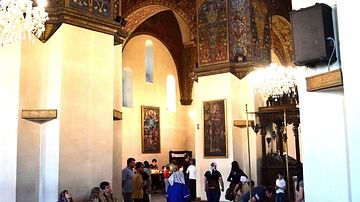
Image
Interior of Armenia's Etchmiadzin Cathedral
This a photograph of the interiors of Etchmiadzin Cathedral, which is located in Etchmiadzin, Armenia. (It's currently under reconstruction.) According to many art historians, it is the world's oldest Christian cathedral. It has been reconstructed...
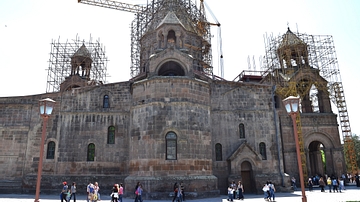
Image
Side View of the Etchmiadzin Cathedral in Armenia
Side view of the Etchmiadzin Cathedral, which is located in Etchmiadzin, Armenia. (It's currently under reconstruction.) According to many art historians, it is the world's oldest Christian cathedral.
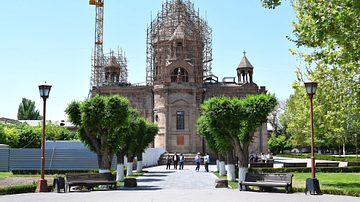
Image
Exterior of Etchmiadzin Cathedral
This is the exterior of the Etchmiadzin Cathedral, which is located in Etchmiadzin, Armenia. (It's currently under reconstruction.) According to many art historians, it is the world's oldest Christian cathedral.
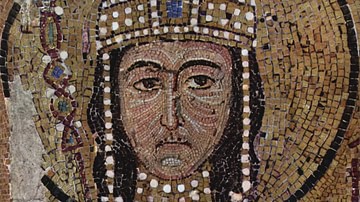
Image
Mosaic of Alexios I Komnenos
This 12th century CE mosaic depicts Alexios I Komnenos (r. 1081-1118 CE), father of Anna Komnene. Anna's famous work is the Alexiad, a recounting of her father's rule as Byzantine Emperor. (Hagia Sophia, Istanbul)
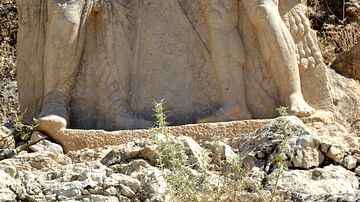
Image
Antiochus I of Commagene Shaking Hands with Hercules
Stone relief from Arsameia (Nemrut region, Turkey) depicting Antiochus I of Commagene (r. 70 - c. 38 BCE) shaking hands with Hercules. The Commagenian ruler is shown wearing a belted tunic, cloak and a four-lobed dagger. Herakles carries...
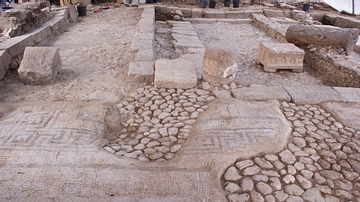
Image
Magdala Synagogue Mosaic
Magdala synagogue of the first century CE with evidence of a mosaic floor and the carved stone in the center area of the synagogue. Under the mosaic a bronze coin of Herod Antipas minted in Tiberias (Year 33 = 29 CE) was found.
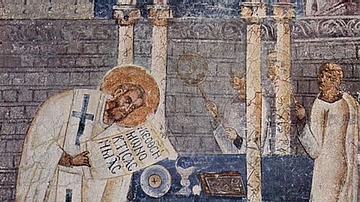
Image
Fresco of Basil the Great
Located at the Cathedral of Ohrid, Macedonia, this fresco, from the 11th century CE, depicts Saint Basil (Basil the Great) blessing gifts in the Divine Liturgy. Basil was born c. 330 CE and died 379 CE.
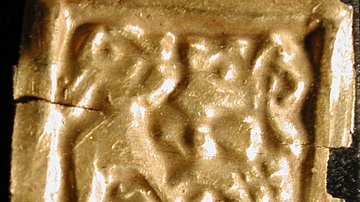
Image
Scandinavian Gold-Foil Picture
Gold-foil picture depicting a couple embracing each other, found in Scandinavia. It is thought to represent the Norse god Freyr and his wife Gerðr united in holy marriage (hieros gamos). These tiny images are known as 'guldgubber' and...
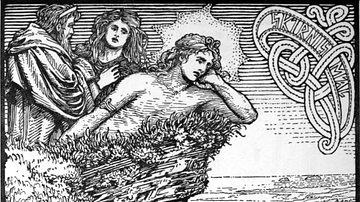
Image
The Lovesickness of Freyr
Artist's depiction showing the Norse god Freyr gazing out from atop Odin's high seat to Jotunheim, realm of the giants, where he espies the giant-daughter Gerðr walking across her garden and instantly falls in love with her. This tale is...
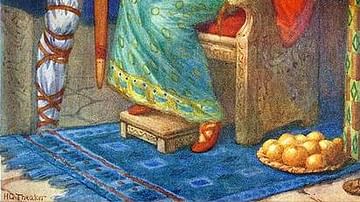
Image
Skírnir and Gerðr
Artist's depiction showing a tale from Norse Mythology recorded in the Skírnismál in which Freyr sends his servant Skírnir to Jotunheim, the realm of the giants, in order to convince the giant-daughter Gerðr to marry Freyr. She refuses, and...